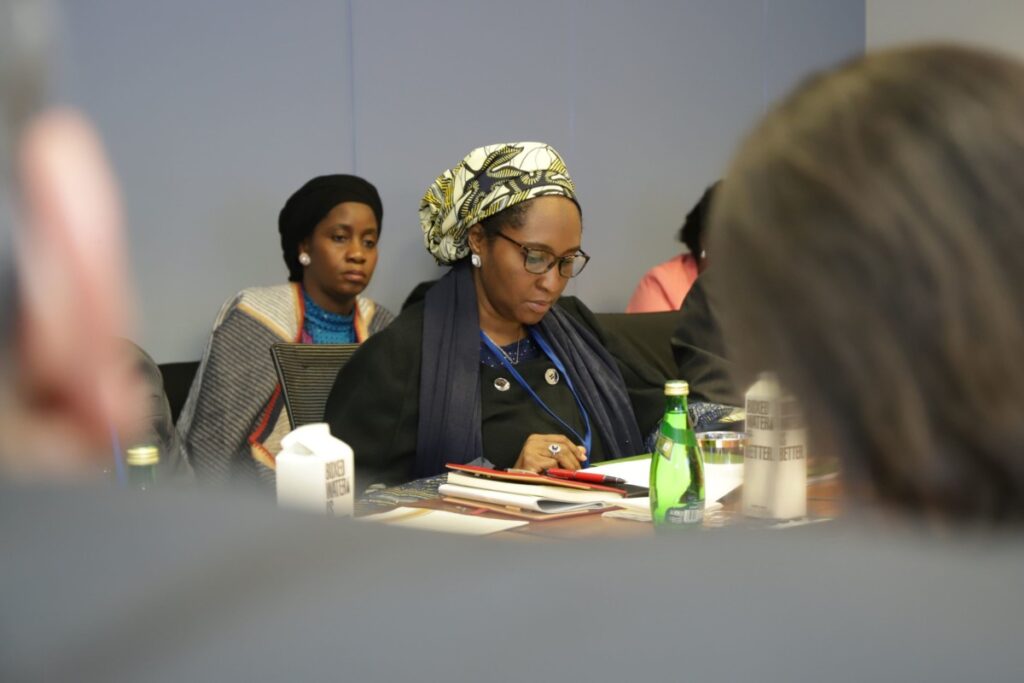If the views expressed by the International Monetary Fund (IMF) staff team at the conclusion of its annual Article 1V Consultation discussions on Nigeria’s economy are anything to consider,
the country has rather been encouraged to sustain its fiscal reform momentum and to keep up with the tightening of its monetary policy.
In view of the fact that Nigeria’s economic growth is looking up, with external vulnerabilities and inflation issue to consider, the Honourable Minister of Finance, Budget and National Planning, Mrs. Zainab Ahmed, is focused on plans by the Federal Government (FG) to achieve revenue to GDP ratio of 15 percent target from the 2023 fiscal year. She will continue to reiterate the President Buhari-led administration’s determination to meet the target.
According to her, the economic growth plans implied that the country would by the year in focus tripled its revenue-to-GDP ratio, which currently stands at eight percent. She maintains that the target has remained feasible with the implementation of the Finance Act accompanying the yearly budgets in the years ahead.
“The 2020 Appropriation Act is designed to be a budget of fiscal consolidation to strengthen our macroeconomic environment; investing in critical infrastructure, human capital development and enabling institutions especially in key job creating sectors”, the minister says.
The government is interested in unlocking the country’s growth potential as well as being very mindful of short-term vulnerabilities through essential economic policies, though the pace of growth appears slow. The inflation – driven by higher food prices – is obviously as a result of the border closure. However, the inflationary trend will definitely adjust subsequently.
In the face of external vulnerabilities, fiscal deficits as a result of weak non-oil revenue mobilisation, “the exchange rate has remained stable, helped by steady sales of foreign exchange in various windows”, according to IMF team.
On “recognising the vulnerabilities”, the FG has taken a number of welcome steps. “These include measures to boost revenue through the adoption of the Finance Bill and Deep Offshore Basin Act and; and improve budget execution by adopting the 2020 budget by end-December 2019. The tightening of monetary policy in January 2020 through higher cash reserve requirements to respond to looming inflationary pressures is welcome. Progress on structural reforms—particularly in Doing Business, finalising power sector reforms, and strengthening governance — is commendable.”
Of course, “major policy adjustments remain necessary to contain short-term vulnerabilities, build resilience, and unlock growth potential”, and there have been “structural reforms —particularly executing the much-delayed power sector recovery plan, implementing the anti- corruption and financial inclusion strategy, and addressing infrastructure gaps — to boosting inclusive growth.”
“Non-oil revenue mobilisation — including through tax policy and administration improvements — remains urgent to ensure financing constraints are contained and the interest payments to revenue ratio sustainable.
In line with the FG debt management strategy which aims to replace short-term high-interest domestic debt with low-interest long-term external debt to moderate the level of debt servicing, Nigeria, by the Fiscal Responsibility Act, has a ceiling of 25 percent on the total debt stock to GDP, and the borrowing still allows Nigeria to stay within the thresholds. The ratios as of December 31, 2018, and June 30, 2019, were 19.09 percent and 18.99 percent respectively.
The FG looks to use the 2020 Finance Bill to raise N8.155 trillion as it moves to implement the tax reforms. The debt service to revenue ratio, however, is high; it has been higher than desirable and provides strong justification for the current drive to increase both oil and non-oil revenues to service our debt obligations, says Ahmed. The Finance Bill has introduced tax reforms to help government achieve its revenue projections for the 2020 Budget (N8.155trillion).”
Nigeria’s outlook has improved after a strong end to 2019, but most economic watchers believe it needs to grow much faster to pull large chunks of its 200-million strong population out of poverty. At the event focused on the Nigerian economic outlook in 2020 and its implications for the Nigerian marketing communications sector, Mr. Bismarck Rewane, Managing Director and Chief Executive Officer, Financial Derivatives Co. Ltd., stated that Nigeria’s business environment would be shaped by initiatives from the government. He said the economy would be expanded while foreign direct investment (FDI) would increase.
He said the shaping of the economy and attraction of FDI would be due to projects like construction projects; Lekki Deep Seaport, Lagos-Ibadan railway as well as the newly introduced Finance Act. Other factors are border closure policy, the cost-reflective electricity tariff policies, and the cashless policy, among others were bound to expand the economy and attract more FDI.
According to Rewane, more businesses will be created despite the projection of slow economic growth. “I believe with the FG introducing intervention policies and subsidies, it is certain that more businesses would spring up which would consequently necessitate increased spending.”
Monetary policy has continued to be shaped by developments in the global and domestic economic and financial environment. The Governor of Central Bank of Nigeria (CBN), Mr.
Godwin Emefiele, had disclosed parameters such as Monetary Policy Rate (MPR), liquidity ratio, and asymmetric corridor remaining unchanged. The decision of the MPC to raise the CRR is informed by recent inflationary pressure in the economy and the decision to hold other rates was informed by the conviction of the committee members that there is a need to observe the response of the economy to several policies introduced by the apex bank.
That “further tightening of monetary policy—albeit through more conventional methods—is needed to contain domestic and external pressures arising from large amounts of maturing of CBN bills, the apex bank will always act to appropriately adjust the policy rate in line with unfolding conditions and outlooks. Its interventions will always be determined by the peculiarity of the Nigerian economic environment and circumstances, and in the best light, addressing the banking system vulnerabilities, considering thrashing the issue of legacy non-performing loans and “the introduction of risk-based minimum capital requirements to help strengthen bank resilience.”
There is no gainsaying that economic diversification is needed to ensure inclusive growth that would provide jobs for the rising unemployed Nigerians. The success of any economic diversification and inclusive growth strategy rooted in structural reforms, which the country is in serious pursuit, is anchored on properly implementing the anti-corruption and financial inclusion strategy, and addressing infrastructure and gender gaps and industrialisation, In turn, massive industrialisation depends on a robust, sound and highly efficient power sector which will ultimately bring about the needed and envisaged economic transformation.






